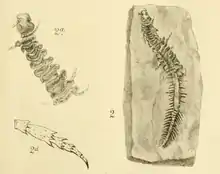Archidesmus
Archidesmus is an extinct millipede genus from the Lower Devonian Old Red Sandstone of the United Kingdom. It is the only member of the taxonomic family Archidesmidae. Individuals were up to 5 cm (2.0 in) long, and had 60 to 80 body segments decorated with tubercles (bumps) on the upper surface, and most segments possessed wing-like keels (paranota) extending to the side. The type species Archidesmus macnicoli was described by British paleontologist Benjamin Peach in 1882.[1] A second species, A. loganensis was also described by Peach[2] but its status as a valid species- or even a myriapod- is debated.[3]

A. macnicoli illustrations
| Archidesmus | |
|---|---|
 | |
| Archidesmus macnicoli fossil illustration, anterior end is towards the left. | |
| Scientific classification | |
| Kingdom: | |
| Phylum: | |
| Subphylum: | Myriapoda |
| Class: | |
| Order: | |
| Family: | †Archidesmidae Scudder, 1885 |
| Genus: | †Archidesmus Peach, 1882 |
| Type species | |
| Archidesmus macnicoli | |
| Species | |
| |
References
- Peach, B. N. (1882). "On some fossil myriapods from the Lower Old Red Sandstone of Forfarshire". Proceedings of the Royal Physical Society. 7: 177–188.
- Peach, B. N. (1899). "On some new myriapods from the Palaeozoic rocks of Scotland". Proceedings of the Royal Physical Society. 14: 113–126.
- Wilson, Heather M.; Anderson, Lyall I. (2004). "Morphology and taxonomy of Paleozoic millipedes (Diplopoda: Chilognatha: Archipolypoda) from Scotland". Journal of Paleontology. 78 (1): 169–184. doi:10.1666/0022-3360(2004)078<0169:MATOPM>2.0.CO;2.
This article is issued from Wikipedia. The text is licensed under Creative Commons - Attribution - Sharealike. Additional terms may apply for the media files.